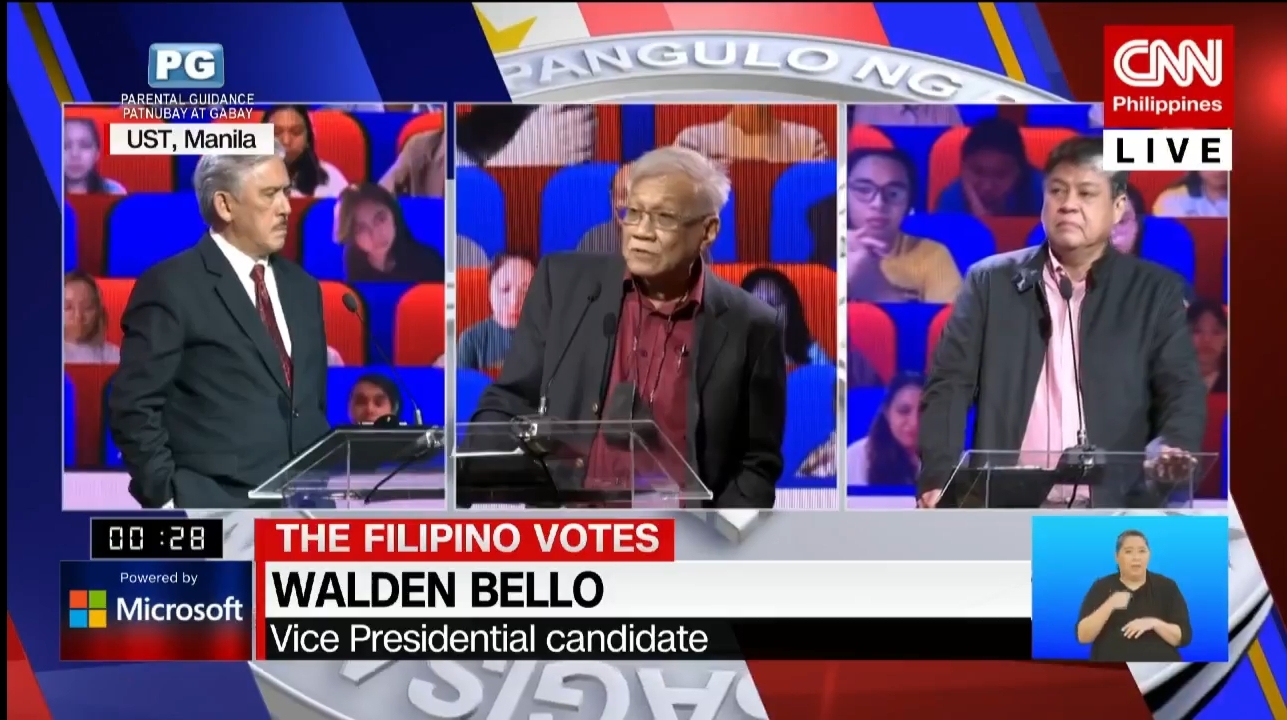
THE LIBERALIZED ‘foreign-oriented’ policies led by the incumbent Senate President and vice presidential aspirant Vicente “Tito” Sotto III did not bode well with former Akbayan Partylist representative Walden Bello.
Bello wanted the amendments of Retail Trade Liberalization Act and Foreign Investment Act to be repealed, saying that Sotto’s business policies are detrimental especially to small businesses. He also hit Sen. Francis Pangilinan for signing these laws.
“Paano ‘yan? Sinasabi niyo for Filipino kayo, and then you’re liberalizing all these laws?” he said.
The amendments on these laws consist of decreasing the investments required for foreign enterprises, eliminating a certificate of pre-qualification from the Philippine Board of Investments, and reducing the minimum capital requirements.
Bello also reiterated that the policies would be “sending this country and the SMEs to the hands of all these foreign enterprises that will eat them up.”
In response, Sotto circumvented Bello’s argument stressing that these laws were important to “uplift the economy.”
“We have lowered the threshold for those who want to invest in foreign investments because that is the way to open the economy,” Sotto said.
Pangilinan, on the other hand, admitted that it is impossible to be completely independent of foreign investments as it is a “necessity.”
“Kailangan nating balansehin, hindi pwedeng bawal ang lahat ng foreign investment o kaya restrictive to the degree na hindi na lalaki ang ating ekonomiya… At the same time, suportahan ang ating lokal businesses (We need to balance it out, we should not ban all foreign invesment of ne restrictive to the degree that our economy will not expand… At the same time, se should support local businesses),” he said.
Financial assistance
Many small businesses were hit hard by the pandemic. In April, 2020 alone, the Asia-Pacific MSME Trade Coalition survey revealed that businesses encountered issues on operational cash flow, low customer demand, closures due to lockdown, and less opportunities for new clients.
Vice presidential candidate and lawyer Carlos Serapio pointed out that he was able to study the Bayanihan 2 law and it was able to provide assistance for MSMEs.
“Ang magagawa lamang po namin ay sumunod po kami doon sa tinatadhana ng batas at ipatupad po namin ito nang mahusay (The only thing we can do is to follow the law and implement it excellently),” Serapio added.
Pangilinan, on the other hand, harped on his plans with his running mate Vice President Maria Leonor “Leni” Robredo on appropriating a budget for cash assistance.
“Ang Robredo-Pangilinan tandem, ang kanyang mungkahi ay kumuha ng 100 bilyong piso mula sa mga realignment ng ating current budget at suportahan ‘yong SMEs bilang ayuda (The suggestion of Robredo-Pangilinan tandem is to get P100 billion-peso budget from the realignment of the current budget to support SMEs),” Pangilinan said, adding that the assistance would not be considered as loans.
But this assistance would come with conditions beneficial both to the afflicted businesses and workers—and by extension the economy. Photo
“Halimbawa, makakakuha ka ng ayuda kung hindi mo tatanggaling ang iyong mga empleyado so we can preserve these jobs. Two, kung kukunin mo ulit ‘yong mga tinanggal mong empleyado (For example, you will get assistance if you will not lay off your workers so we can preserve these jobs. Second, if you will rehire the workers you laid off),” he added. F — Eduardo Fajermo Jr. and Bless Aubrey Ogerio



